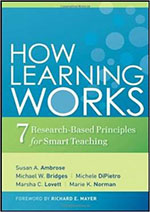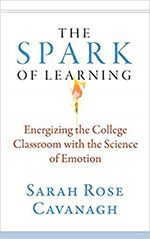What Do You Know?
Learning, real learning, is a process of change. When we learn, we change our minds. We develop new skills and new perspectives; we approach problems differently; we make different decisions. We’re building new neural connections, changing our brains.
Our courses are opportunities for students to grow: the powerful learning experiences we provide during the next fifteen weeks may change their minds—and ours.
When we want to gather evidence of learning, then, it helps if we can measure change. That means it’s useful to get a baseline. What do your students know now, at the beginning of the term? What can they do? To gather data on what students know at the start of the semester, you might try an ungraded quiz, a concept inventory, a self-assessment probe, diagnostic writing, or many other methods.
There are additional benefits to probing students’ knowledge now: Richland, Kornell, and Kao (2009) and Little and Bjork (2011) found that pre-testing, before instruction, enhanced student retention of new material. Although (of course) students didn’t perform well on a test covering completely new concepts, a pre-test seemed to pique their curiosity and focus their attention in later instruction. Getting an accurate assessment of students’ prior knowledge also helps us build effective learning experiences. When we find out what our students actually know (rather than what we think they ought to know), we can shape our lessons and assignments to develop their skills, to activate their prior learning, and to help them make connections.
It’s also useful to prompt students to examine how their own thinking is changing. In coming weeks we’ll share suggestions for helping students develop their metacognitive and self-regulation skills.
Best wishes for a productive and satisfying semester.
Upcoming…
There are a few spots left in two of our faculty reading groups this fall. RSVP here, and we’ll send you your complimentary copy of the book.
Reading Groups
 How Learning Works
How Learning Works
Tuesdays, 12:00-2:00
9/10, 9/17, 9/24
This book distills the research on cognition, translating decades of scientific literature into practical advice for university faculty and introducing seven general principles of how people learn. The authors draw on research from cognitive, developmental, and social psychology, as well as educational research, anthropology, etc. The discussion spans issues from memory to motivation, integrating theory with real-classroom examples in practice. Participants will develop strategies for strengthening their own teaching through the application of these principles of cognitive psychology.
Please feel welcome to bring your lunch to this brown-bag lunch-hour session.
 The Spark of Learning: Energizing the College Classroom with the Science of Emotion
The Spark of Learning: Energizing the College Classroom with the Science of Emotion
Thursdays, 2:00–4:00
9/12, 9/19, 9/26
Most of our preparation for teaching (both our training and our planning) focuses on the content, and the thinking students need to do, but Sarah Rose Cavanagh reminds us that learning is a highly emotional process. Anxiety and fear hamper learning, while powerful positive emotions can enhance it. Cavanagh offers concrete strategies for harnessing the power of emotion to galvanize learning.



